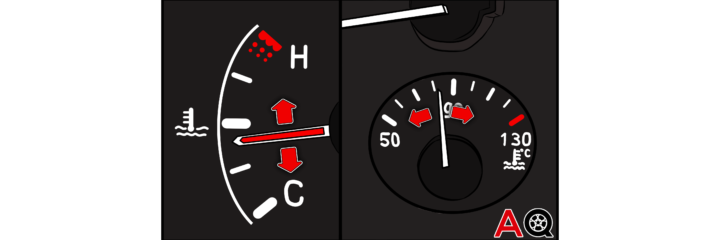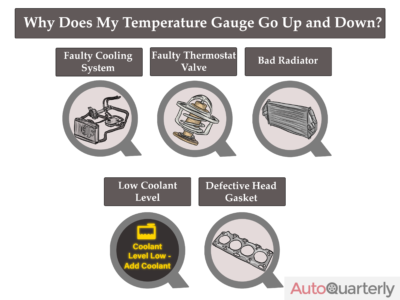The temperature gauge is a dial on your dashboard that indicates your engine coolant’s temperature level. It is designed to tell if your engine’s coolant is at a high, cold, or normal temperature. If the reading is high, it is an indication that your engine is overheating or losing coolant. The temperature gauge will read cold if the engine hasn’t been warmed, for example, in the morning. If the gauge still reads cold afterward, the temperature gauge could be faulty.
If the temperature gauge rises and falls randomly, though, then something is wrong. DIYing your way through the development could leave you even more confused as the problem could be from any of the components that make up the cooling system, such as the thermostat, the radiator, and the head gasket. In this article, we will discuss in some detail the factors that could cause your car’s temperature gauge to go up and down.
1. Faulty Cooling System
The cooling system prevents the engine from overheating and breaking down. It does this by ensuring the optimum engine operating temperature is maintained by absorbing and expelling engine heat. By helping the engine run at an appropriate operating temperature, the cooling system ensures the engine is not too cold or too hot.
The cooling system is comprised of the thermostat, radiator, water pump, fan, pressure cap, reserve tank, heater core, and hoses. A problem with any of these components can be responsible for the temperature gauge randomly moving up and down.
2. Faulty Thermostat Valve
The design of the thermostat requires it to open and close as it does the job of regulating the engine temperature. The valve opens up to allow coolant flow to the engine to cool the engine when the engine warms up. The valve remains closed when the engine temperature drops closer to the low range of the engine’s optimum operating temperature.
So, if the thermostat is faulty, the valve may remain open or stay closed perpetually. A bad thermostat will also open and close injudiciously, causing the engine to overheat or lose heat to the radiator. The temperature gauge will then read erratically.
3. Bad Radiator
A bad radiator will cause your engine to overheat or take too long to warm up which will, in turn, make your temperature gauge randomly go up and down. A bad radiator could be an issue with the radiator fan and/or radiator cap.
If, for example, the heater is not functioning, or you notice a discolored sludge (dirty coolant due to contamination) in the radiator, it’s a clear sign your radiator is bad. Don’t postpone fixing this particular issue because you may end up with extensive damage to the engine and transmission due to restricted cooling and temperature regulation.
4. Low Coolant Level
At this point in this article, you already know a lot about coolants, as I have mentioned them several times already. Apparently, the coolant plays important role in maintaining engine health and optimum performance.
If the coolant level is low, the engine is not properly cooled, and that will cause the engine to overheat, which means the engine temperature level rises, possibly causing the gauge to read erratically. You should check for coolant leaks even after topping off, just to be sure.
5. Defective Head Gasket
A defective head gasket could also make your temperature gauge rise and fall. The head gasket handles the safe and proper circulation of coolant and oil in the engine. By “safe,” we mean that the head gasket prevents the coolant and oil from mixing as both fluids travel from the engine block to the cylinder head.
A faulty head gasket will cause oil and coolant to mix. This oil-coolant mixture will then clog the coolant passageways, making it difficult if not impossible for the coolant to flow to the engine and cool it, the result of which is an overheating engine and a possible erratic temperature gauge.
To Recap
Your car’s engine relies on the cooling system to expel excess heat and maintain the optimum engine operating temperature. Should any of the components comprising the cooling system fail, it can cause your temperature gauge to fluctuate unusually.
The temperature gauge can also become faulty and malfunction. A maintenance routine will definitely enhance the health and efficiency of your car’s various parts, but a problem can still develop. Visit your mechanic if your temperature gauge starts to misbehave. I’ve got to admit there’s just this special peace of mind that comes from at least having some idea of what you might be dealing with, but troubleshooting a temperature gauge issue can be tricky without the expertise of a qualified automobile technician.



